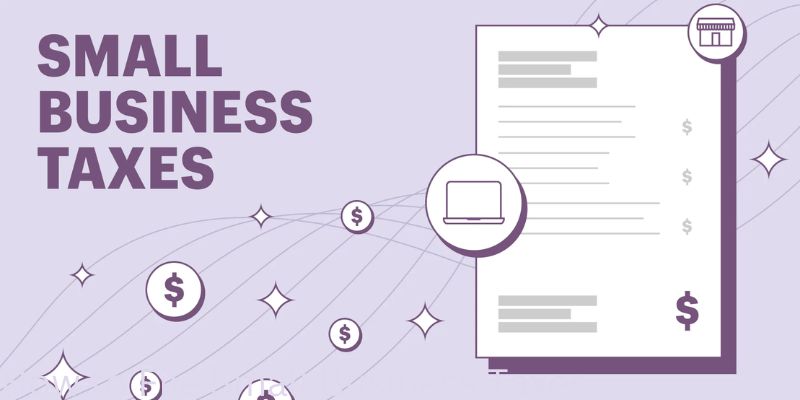How to File Small Business Taxes?
Triston Martin
Feb 05, 2024
Are you a small business owner who needs help filing taxes? If so, then you're in luck. This blog post will discuss how to file taxes for your small business. We will break it down into easy-to-follow steps to ensure the process is as straightforward and stress-free as possible.
From understanding what documents are needed to taking advantage of available deductions, this comprehensive guide covers everything when filing taxes for your small business. So keep reading and learn all you need to know about completing this crucial task quickly and accurately!
Understand The Basics Of Filing Taxes For a Small Business

Filing taxes for a small business can seem overwhelming, especially if you are unfamiliar with the process. However, understanding the basics of filing taxes for a small business is essential to ensure accuracy and compliance.
Knowing when forms must be filed, what documents are needed, and how to take advantage of available deductions will help streamline your tax-filing process.
To begin preparing your taxes as a small business owner, familiarize yourself with the due dates and deadlines established by the IRS. These taxes include both federal and state taxes. Additionally, it's important to understand which forms you'll need to file based on your business type (e.g., sole proprietorship or LLC). These forms are often available on the IRS's website.
Finally, you must know of any tax deductions or credits you might qualify for as a small business owner. Taking advantage of these can help reduce your overall tax liability and save money in the long run. Whether this means researching specific deductions or hiring a professional tax advisor, take the time to investigate all options that may apply to you.
Research the Federal And State Tax Laws That Apply To Your Business
Researching tax laws is critical in filing taxes for your small business. The federal and state government each have their own set of tax laws that you must adhere to to comply with the law. Not all businesses are subject to the same rules, so research which ones apply.
The first step is understanding the types of taxes your business may need to file: income, payroll, sales/use, property, etc. Once you know what type of taxes must be filed, it's important to research the specific federal and state requirements associated with each type. These steps will ensure you file correctly and accurately so your company remains compliant.
You can also use the IRS website to find helpful documents that will guide you in understanding and complying with federal tax laws. Additionally, many states have websites that provide businesses with information on state-specific taxes.
Understanding all the relevant federal and state tax laws is important before filing taxes for your small business. Doing so will help ensure your organization is compliant and avoid penalties or issues.
Calculate Your Estimated Taxes Based On Your Income Level

Estimating your small business taxes is essential to filing the correct amount. Accurately predicting how much you owe can be tricky, but fortunately, there are a few ways to make it easier.
First, calculate your estimated taxes based on your income level. This calculation will help you decide which tax bracket you fall into and give you a ballpark figure for what you should expect to pay in taxes.
Additionally, consider any deductions or credits that may apply to your situation. Taking advantage of these options can lead to major tax savings!
Finally, keep track of all receipts throughout the year so that every expense can be properly accounted for when filing taxes.
By taking these steps, estimating small business taxes should become simpler and leave less room for miscalculation.
Gather All Required Documents And Financial Records About Your Business
Filing taxes for your small business can seem daunting but don't fret - it's easier than you might think. Before getting started, gathering all the required documents and financial records about your business is important.
This documentation includes income statements, balance sheets, expense reports, receipts, invoices, and other paperwork to help determine your company's total taxable income for the year.
Additionally, if you are filing with a CPA or accountant, they may require additional documentation to properly file taxes on your behalf. Gathering these items will ensure everything goes smoothly when tax season rolls around.
So take some time now to get organized and ensure you have all the necessary information ready - doing so will save you a lot of stress and hassle during the filing process.
Know How To Use Deductions, Credits, And Other Tax Strategies To Reduce What You Owe
For small business owners, understanding how to use deductions, credits, and other tax strategies can make all the difference in reducing what you owe. By taking advantage of these opportunities, you could pay significantly less taxes—potentially saving your business thousands of dollars.
Deductions are items that reduce your taxable income and lower the amount of taxes you owe. Popular deductions for small businesses include:
- Vehicle expenses.
- Home office deductions.
- Self-employed individuals pay health insurance premiums.
- Costs associated with setting up a retirement plan.
Credits are like discounts on what you owe—they directly reduce your tax bill instead of lowering your taxable income. Popular credits for small businesses include the Earned Income Tax Credit, the Child and Dependent Care Credit, and the Small Business Health Care Tax Credit.
Other tax strategies can help your business reduce what it owes, such as creating a separate business entity to take advantage of different tax rates or writing off certain investments as losses.
File Either Electronically Or By Mail With The IRS And Your State's Government
Filing your small business taxes can seem like a daunting task. Luckily, the Internal Revenue Service (IRS) and most state governments have made it easy for small businesses to file their returns electronically or by mail.
Electronic filing is fast, secure, and free of charge on the IRS website. Additionally, you can only take advantage of certain deductions when filing electronically. For those more comfortable with traditional methods, you can send paper copies of your forms to the IRS or applicable state organization via standard mail.
Whichever method you choose, ensure all documents are filled out correctly and submitted on time to avoid any late fees or penalties! Ultimately, knowing how to properly handle filing taxes for your small business will help you stay organized and up to date on your taxes in the future.
FAQs
How much money must I make to file taxes for a small business?
The short answer is that it depends. Generally speaking, businesses that make more than $400 in annual profit must file taxes with the IRS.
Do you need help doing your small business taxes?
No, not at all! You can take a few simple steps to make the process easier.
Will I get a tax refund if my business loses money?
A tax refund is only possible if your business records a net loss. However, you can use those losses to lower your taxable income and offset taxes in other areas.
Conclusion
Filing small business taxes may seem intimidating—but it doesn't have to be. Staying organized and educated on federal and state tax laws is key to filing small business taxes accurately and on time. Business owners need to know how to use deductions, credits, and other strategies to reduce their debts.
Additionally, ensure you gather all the documents and financial records needed to file taxes. Finally, remember you can file electronically or by mail with the IRS and your state's government.







